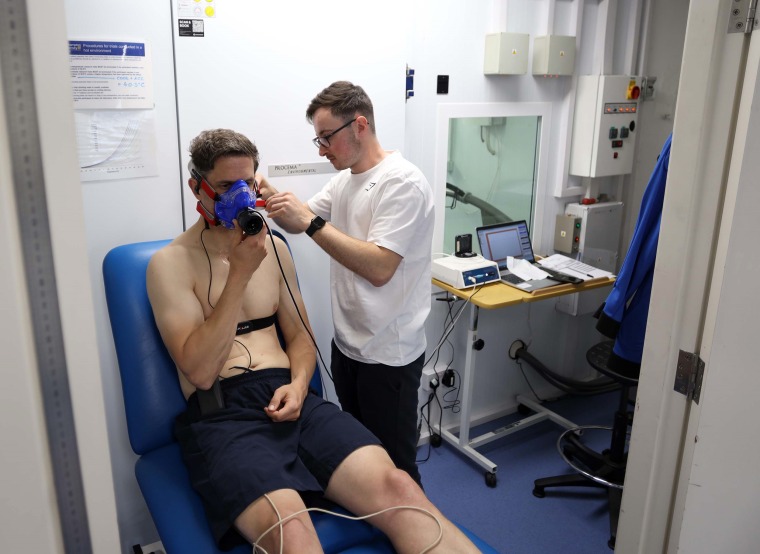As a deadly heat wave continues to ravage the U.S., new evidence suggests the human body may stop functioning optimally when outside temperatures climb to 104 to 122 degrees Fahrenheit.
Research presented Thursday at the annual Society for Experimental Biology conference in Edinburgh, Scotland, suggests that temperatures in that range raise a person’s resting metabolic rate — the amount of energy needed to function at rest.
When that happens, people may start to breathe more heavily and their heart rates can go up. Once a person’s body can no longer get rid of excess heat — a condition known as “heat stress” — the core temperature rises. That can result in confusion, nausea, dizziness, headache or fainting.
“People are typically quite good at acclimating to heat, up to a point,” said Lewis Halsey, a professor of life and health sciences at the University of Roehampton in England who conducted the research.
Halsey, who published the results of his first set of experiments in 2021, shared findings Thursday from a second set that focused on heat and heart activity.
For the first experiments, Halsey and his research team asked 13 adults under age 60 to lie in a chamber and exposed them to different temperatures and humidity levels for an hour apiece. The researchers measured people’s resting metabolic rates, core temperatures, blood pressure, heart rates and breathing rates.
The results indicated that people’s resting metabolic rates rose when they encountered temperatures of at least 40 degrees Celsius (104 degrees Fahrenheit).

As a baseline for comparison, the researchers used 28 degrees Celsius (around 82 degrees Fahrenheit) with 50% humidity, because humans can comfortably maintain their core body temperature in those conditions.
At 40 degrees Celsius and 25% humidity, participants’ metabolic rates increased by an average of 35% compared to the baseline, but their core body temperatures did not go up.
However, at 50 degrees Celsius (122 degrees Fahrenheit) and 50% humidity, people’s core temperatures rose by an average of 1 degree Celsius. People’s metabolic rates also rose by 56%, and their heart rates went up by 64%.
A threshold at which sweating no longer helps
Several parts of the U.S. have had temperatures above 104 degrees over the last several weeks. Death Valley, California, reached 122 degrees on Monday, and temperatures in several Texas cities topped 110 degrees last week.
Globally, data from the University of Maine’s Climate Change Institute suggests that this Fourth of July may have been the hottest day ever recorded on Earth.
Halsey, who personally participated in his experiments, said the environment at 50 degrees Celsius is “pretty grim,” because not even sweat can cool you down.
“Being able to sweat is a bit of a superpower — unless it’s very humid, and then the sweating mechanism doesn’t work, because the sweat doesn’t go anywhere. It just builds up on the skin,” he said.
Halsey estimated that if participants had stayed in the chamber at 50 degrees Celsius and 50% humidity for a long time, they might not have survived, though the researchers are not sure how much exposure would be fatal.
“They’d have died in the end, because their core temperature would increase and increase,” Halsey said. “The body would be struggling to dump the heat.”
On Thursday, Halsey presented the results of his newer experiments, which involved 24 participants, some of whom were part of the original study. This time, the researchers used echocardiograms, or heart ultrasounds, to examine people’s heart activity at 50 degrees Celsius and 25% humidity.
They found that women’s heart rates increased more than men’s on average. That might suggest that female bodies are not as efficient at getting rid of excess heat, Halsey said.
But he added: “There’s no way I can say to you: ‘Aha! Therefore women or men are going to struggle more in the heat because of this.'”
‘Don’t be a hero’
Halsey’s research helps explain why extreme heat can be deadly, said Kim Knowlton, an assistant clinical professor of environmental health sciences at Columbia University.
“There are a lot of people around the world — millions, if not more — who are exposed to those conditions” in Halsey’s study, Knowlton said.
People with pre-existing heart and lung issues are most vulnerable to extreme heat, along with older adults, pregnant people and newborns, she said.
The U.S. averages 702 heat-related deaths every year, according to the Centers for Disease Control and Prevention.
But Michael Sawka, a physiologist at Georgia Tech’s School of Biological Sciences, questioned whether metabolic rate plays a role in heat stress. He pointed to his own research showing that, at 40 degrees Celsius, people exhibit lower metabolic rates during exercise after they acclimate to the heat.
“To say that when it gets hot out people increase their resting metabolic rate doesn’t make a lot of sense to me,” Sawka said.
He guessed that participants’ metabolic rates may have risen in the study because they were fidgeting owing to discomfort. He also questioned whether the results would apply to people who are accustomed to higher temperatures, because the U.K. has a temperate climate.
However, Knowlton said, everyone should take precautions on extremely hot days.
“If you feel like you’re faint or dizzy or you feel sick, take it really seriously,” she said. “Don’t be a hero and keep forging through the heat.”
Source: | This article originally belongs to Nbcnews.com









